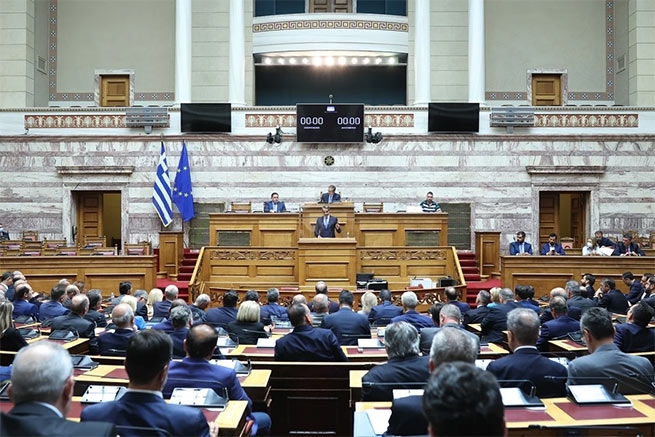bill on cancellation of message privacy, cybersecurity and personal data protection, which was submitted for public comment two weeks ago, was submitted to the Hellenic Parliament today.
According to a statement from the Justice Department, the bill aims to strike the necessary balance between privacy and national security within the framework of the constitution, based on international best practice. The bill strengthens the rights of citizens against the threats posed by technological development, while modernizing the relevant legal framework created in 1994 and addressing recently identified shortcomings, the ministry emphasizes. In particular:
Criminal law is equipped with the necessary tools to work with software and surveillance devicesemphasized in the Ministry of Justice:
“The use of software and surveillance devices by private individuals is being raised to the level of a criminal offense and punishable by imprisonment for up to ten years, whereas today it is a simple misdemeanor. Similarly, trafficking and simple possession, which are not currently criminalized, are now classified , as minor offenses, with a penalty of up to five years. Prohibited programs and monitoring devices are listed in a special list, which is publicly available and constantly updated, and the purchase of monitoring programs by the state is possible only on the basis of a presidential decree, which will be processed by the State Council. “
New guarantees have been introduced in the work of the National Intelligence Service. As emphasized by the ministry, “For the first time, an Academy of Intelligence and Counterintelligence is being created, the task of which is to train, educate and specialize employees, and an internal control department for the phenomena of misconduct and corruption in ΕΥΠ, as well as guarantees of publicity for the work of the Center for Technology Support, Development and Innovation ΕΥΠ. Special conditions are set for the selection of a commander, who can only be a diplomat or a retired senior officer.”
Strengthened the basis for removing privacy. According to the Justice Department, “For the first time, the law clarifies the term ‘national security’ and provides that only ΕΥΠ and the anti-terrorist service can request the removal of secrecy, subject to strict documentation requirements.” Additional safeguards are also provided, including for the first time when the cancellation concerns political figures, in which case an immediate and highly probable risk to national security is required, as well as the permission of the chairman of parliament. There is a mandatory notice of cancellation after three years from the date of its termination, provided that the purpose for which the cancellation was ordered is not violated, as assessed by a three-member special body, with the participation of two prosecutors and the president of the Communications Privacy Protection Office. The list of crimes justifying the removal of the secrecy stamp has been rationalized and systematized, and the procedure and deadlines for the destruction of surveillance materials have been standardized by law.
A new rigorous cybersecurity protection system has been created and personal data protection has been strengthened. To solve the problem of fragmentation of relevant structures, a cybersecurity coordinating committee has been established, and a Single Help Center has been established under the Ministry of Digital Governance. For the first time, a national risk assessment plan for information and communication technology systems is also being prepared, according to the Department of Justice, to identify, analyze and assess risks and their implications for the security of information and communication technology systems at the national level. Finally, attention is drawn to the ambiguity of including the appropriate framework EU for the protection of personal data.
According to a statement from the Justice Department, the draft bill on communications privacy, cybersecurity and personal data protection introduced in Parliament includes a number of proposals made during consultations and public debate, as well as further improvements. Specifically, as the ministry notes: “The definition of ‘national security reasons’ that can justify the abolition of secrecy has been significantly narrowed. “National security reasons” are now defined as those related to the protection of the essential functions of the state and the fundamental interests of the citizens of Greece, while the corresponding indicative list includes only reasons related to national defense, foreign policy, energy security and cyber security.”
Increased documentation requirements apply to a request to override confidentiality for reasons of national security. This request must include the reasons for the national security risk, the need to remove the secrecy to eliminate the risk, the subject of the removal, i.e. the external elements of the message and/or its content, and the strictly necessary duration. Any extension of the withdrawal of confidentiality on grounds of national security, beyond ten months, is only possible if it can be confirmed that there are still specific elements that make an immediate and highly probable threat to national security.
Increased safeguards are provided for the independence of the tripartite body that decides on the notification of the removal of secrecy on grounds of national security. It now consists of two prosecutors and the president of the Communications Privacy Protection Office. On the contrary, the participation of the director of the NSA and the director of the department for combating terrorism is no longer envisaged. Confidential summary minutes are also provided for and minority opinions are recorded.
The procedure for destroying surveillance materials is even more standardized. It is clarified that files containing documentation materials can be destroyed after ten years, and materials recorded in the feedback system are deleted after six months. A report shall be drawn up in each case of destruction or removal. The list of offenses that justify the abolition of privacy is further streamlined. Cancellation of confidentiality is now allowed only in relation to crimes of special gravity, the investigation of which requires restriction of the right to confidentiality of messages. The corresponding list is also systematized in the same legislation in order to increase legal certainty.
Within the General Directorate for Cybersecurity of the General Secretariat for Telecommunications and Posts of the Ministry of Digital Management, a unified cybersecurity help center has been established. The purpose of the center is to develop, support and strengthen the national level capacity for early detection and response to cyber threats throughout the country, in particular, by expanding the capabilities of early warning, detection and response to cyber attacks.







More Stories
Greece will not give Ukraine either S-300 or Patriot (video interview)
MP beat up his colleague in the Greek Parliament
EU Commission warns Greece and Cyprus against fraud